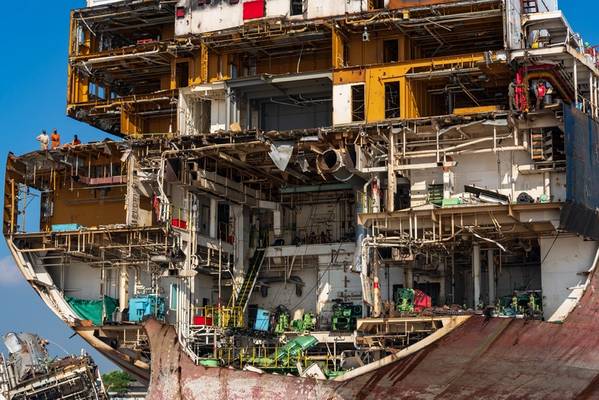
Classification society DNV GL launched a new guidance on vessel recycling to help shipowners navigate a regulatory environment that is becoming increasingly complex.
With the IMO Hong Kong Convention not yet in force, strict enforcement of the EU Ship Recycling Regulation (EU SRR) and the EU Waste Shipment Regulation (EU WSR) means shipowners must carefully plan for the end of life of their vessels amid a much stricter and more complex set of international, regional and national requirements than in the past. With regulators targeting shipowners with significant financial penalties, even criminal offences, shipowners need a careful and considered strategy for dealing with ship recycling of their vessels.
“Ship recycling is an area where we can see significant pressure building in our industry, both from regulators, wider stakeholder groups and the public,” said Knut Ørbeck-Nilssen, CEO of DNV GL – Maritime. “This means that ensuring compliance is essential for shipowners looking to protect their reputations and businesses, while building trust that their vessels are recycled in a safe and sustainable manner.”
DNV GL says its new guidance “Ship Recycling: Navigating a Complex Regulatory Landscape”, aims to give a better basis for decisions on the recycling of vessels. It sets out the main recycling options, the legal, reputational and financial risks, and provides a process that can help to assess whether an individual yard is likely to carry out recycling to an acceptable level, in line with recognized regulations and standards. This process has been designed by DNV GL to provide owners a template for action, in the absence of internationally accepted certifications outside the EU scheme, when they are dealing with yards not on the EU approved list, the classification society says.
“Recent cases have shown that without a clear awareness of the risks within the complex regulatory landscape that surrounds recycling, shipowners can find themselves facing major financial and opportunity losses,” says Jannicke Eide Fredriksen, DNV GL – Maritime. “With this new guidance, DNV GL is working to support shipowners in their decisions, by setting out the standards involved and the many critical factors to consider, primarily when dealing with yards that are not included on the EU approved list.”
The full guidance can be downloaded here.




